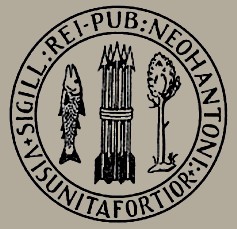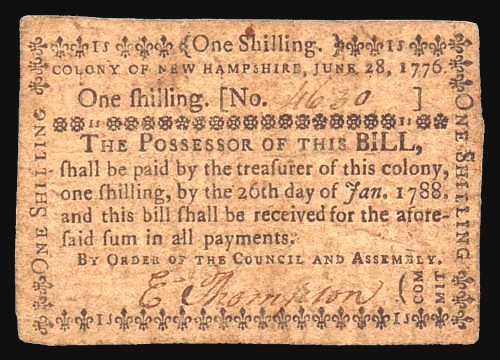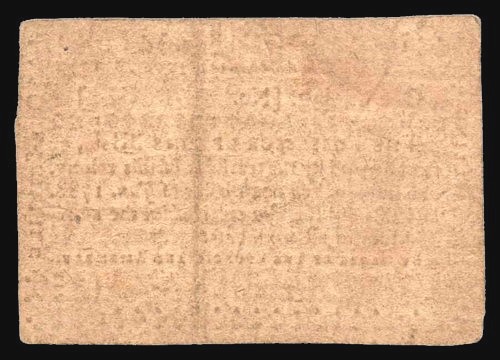NEW HAMPSHIRE COLONY
New Hampshire

Ebenezer Thompson was born on March 5th, 1737 to Robert and Abigail Thompson in Durham, New Hampshire. His father had been in the area as early as 1707 when, in September of 1707, while clearing a section of forest, he and his party were attacked by Mohawks, which killed eight men, including his father’s brother. Years later, in 1721, his father built the first house in the area, a mere half mile from where the Mohawk attack had occurred.
In 1752, when Ebenezer was 21, his father died suddenly from an unknown cause as he was walking near the house. He left behind his wife, who would live on until 1757, four sons and a daughter. Ebenezer’s parents’ estate was sizable and left them fairly well off. As the youngest son, Ebenezer actually received a sizeable share of the inheritance due to a tradition in vogue at the time called “ultimogeniture”, meaning “Junior Right”. According to this tradition, the youngest male would stay at home to take care of the elderly parents, and in recompense, gave more to them because it was felt that the older brothers had already had enough time in the world to succeed on their own without the burden of caring for their parents. Nevertheless, there was plenty to go around, including many land rights and interests in both saw and grist-mills.
An uncle, Dr. Joseph Atkinson, grew fond of young Ebenezer, and took him under his wing. This uncle shaped Ebenezer’s education and, as he had no children of his own, even made Ebenezer his heir. Ebenezer first became a surveyor, but through his Uncle’s influence, he studied medicine and eventually entered practice as a physician.
Little is mentioned of Ebenezer’s married life, but he did get married on May 22, 1758, to Mary Torr. They had five children and were married 44 years, until Ebenezer’s death.
While he was reportedly a good physician, his heart was not in it, and by 1765, he had entered into local government, being elected as a ‘selectman’, which is a type of board-member of a New England town. He would serve as a selectman, being re-elected annually, for the next 10 years.
Durham was at that period of time in close communication with the city of Portsmouth, New Hampshire, which held the seat of the Governor, The proximity of Portsmouth, the Governor and his court had a strong influence on Durham and other nearby towns.
By February 1766, Ebenezer Thompson was chosen by council to represent the town of Durham at the General Assembly in Portsmouth. On May 10, 1773, Governor Wentworth appointed Ebenezer as the justice of the Peace for Stafford County.
As a member of the General Assembly, Ebenezer helped perform the last act of the Royal Government in all of New Hampshire. In June 1775, three members from Grafton County were sent to serve on the assembly by order of Governor Wentworth only, and without approval from any other branch of government. This was a serious breech in policy and the three members were rejected. Governor Wentworth was of course not amused, and demanded the General Assembly to rescind their determination. They did not, and on July 15, 1775, the General Assembly was ordered by the Governor to adjourn. No further meetings of the General Assembly of New Hampshire would ever meet again under British Rule. Ebenezer was busy enough with the revolutionary cause anyway, already serving as a delegate from Durham at conventions held 10 miles south in Exeter. From July 1774 to January 1776, five of the so-called, ‘General Congresses’ were held in which Ebenezer served as the secretary.
On December 14, 1774, more than four months prior to the battle of Lexington and Concord, Ebenezer Thompson went with at least 12 other men on the first revolutionary military excursion in New Hampshire, and seized the only permanently manned military site, Fort William & Mary in New Castle, now known as Fort Constitution. Travelling to Portsmouth along the rivers in open flat-bottomed cargo boats called Gundalows, they joined others to raid the fort. The fort was permanently, albeit poorly, manned, with only Captain Cochran and five soldiers defending. The raiders, fully aware that they were committing an act of defiance against the crown, stormed the fort. The few defenders responded with volleys of cannon and musket fire. As the raiders scaled the walls, the defenders fought hand to hand with the patriots, but succumbed to their overwhelming numbers. There were of course some injuries, but no fatalities occurred. 100 barrels of gunpowder were removed from the fort, and the British flag was lowered from its mast. Cochran and his men were detained only 90 minutes and then released. The following night the rebels returned and, without gunfire this time, entered the fort and removed muskets, cannon and miscellaneous supplies.
The captured materiel was taken to various locations inland, with a large part of the gunpowder taken first to Durham where it was temporarily hidden under the meetinghouse there, before being removed to specially built magazine. Governor Wentworth quickly declared the raiders to be traitors. Though there was not enough proof to haul them in, Governor Wentworth did remove several men from their appointed posts, including Major Langdon and Major Sullivan from their positions in the Militia, and both Josiah Bartlett and Ebenezer Thompson from their posts as Justices of the Peace. Nevertheless, Ebenezer Thompson continued to act as the Justice of the Peace at least until April 15, 1775.
On April 20, 1774, Ebenezer was picked as one of four men to go to Exeter to represent Durham at the Provincial Council, and to inform the Massachusetts Congressional members of the needs of the country. Ebenezer was also elected as the New Hampshire Secretary of State upon the formation of the state government. He would continue to serve in this position, as well as the Clerk of the Senate, until 1786.
During the fourth General Congress a Committee of Safety was created and its members chosen. The Committee of Safety was a coveted position, but one of great responsibility. During the recess of the General Assembly, the Committee of Safety would act in its place as the executive form of state government, authorizing military expenditures and serving as a judicial arm as well. The appointment of this committee’s members was not taken lightly, as they were to serve as some of the most important men during the revolution. They would need to be men who were patriots, have high morals and integrity, and have gained the trust of the congress. Ebenezer Thompson was such a man and was appointed a member continually from 1775 through 1781, serving not only as a member, but also as the secretary, and Chairman Pro-Tem. In addition to this state Committee of Safety, he also served as a member of the Durham Committee of Safety, Committee of Correspondence and Committee of Inspection. In all, he would be able to act as a judicial member of the town of Durham, the County of Stafford and the State of New Hampshire.
Ebenezer’s role in the paper currency of New Hampshire started on June 9, 1775, when he was chosen to acquire printing plates and print notes of various values to the total amount of £10,050.
The New Hampshire Provincial Congress issued the first issue of paper money since 1763 on June 20, 1775, with signatures by E. Thompson and Nicholas Gilman. Ebenezer would be a signer on four of the seven issues of colonial paper money issued by New Hampshire. On July 06, 1775, there was an order to pay Ebenezer £31 and 4 shillings for the expenses he incurred for making the paper currency emission of £10,050.
Ebenezer still had the time to serve in more ways, however, and during the New Hampshire Congress, in December 1775, Ebenezer, Ben Giles, and Wyseman Claggett, were selected to create the oaths to be made by the of New Hampshire congressional members. He was also appointed to come up with a system of government for New Hampshire to maintain “during the contest with Great Britain”, and as one of the men to write the New Hampshire Constitution in order to set the rules and order for the colony’s government.
In January 1776, he was appointed as one of 12 Councilors of New Hampshire, which was a form of government similar to a senate for the state. Later that same month, he was also appointed as Justice of the Peace for the Colony.
Six months later, on June 28, 1776, the council voted that E. Thompson, along with General Nathanial Folsom and Colonel Matthew Thornton, to be on a committee for the House of Representatives, and to give their opinion on the whether or not they should procure some supplies from a Colonel Morey, and to decide how quickly they should pay him from the New Hampshire treasury.
On the famous date of July 4, 1776, Ebenezer was appointed as another Justice of the Peace, this time for the County of Strafford.
For the next year and a half, Ebenezer seemed contented with serving in his multitudinous roles in the New Hampshire government. As the war continued on, inflation occurred and the rising cost of goods was causing serious problems. Ebenezer Thompson penned evidence to this effect in a letter dated February 27, 1777, found in New Hampshire State Papers from the Revolutionary Period. Reprinted here, he orders the Sheriff of Rockingham County, to seize a sizeable quantity of rum, which the suppliers refused to sell at ‘reasonable’ prices:
State of New Hampshire
In Committe of Safety, Feb 27th, 1777.
To the Sheriff of the County of Rockingham, or his Deputy
Greeting:—
Whereas George Gains of Portsmouth, Esqr (who was employed by this Committee to procure Rum for the American Army) has inform’d the Committee That Robert Parker, Thomas Martin, Neal Mc Intire, Mark Hunking Wentworth, Jonathan Warner, Benjamin Austin, George King, Nathaniel Folsom, George Turner, Jacob Tread well, Ammi Ruhamah Cutter, Robert Furnass, John Hart.Tertius, Daniel & Samuel Sherburne, merchants, each of them, have West India Rum in their possession more than sufficient for their own use and consumption, which they refuse to sell him for the use of said American Army at a Reasonable rate : Therefore you are hereby required in the name of the Government & the people of the State of New Hampshire (taking with you sufficient assistance) to break open any stores, Warehouses, or other places, where such Rum may be deposited, belonging to the above named persons, or in their possession, and take from thence the follow- ing Quantities of Rum: viz.
From Robert Parker, four Hogsheads;
Thomas Martin, Three Hogsheads; Neal McIntire, one Hogshead;
Jonathan Warner, two Hogsheads; Benjamin Austin, one Hogshead;
George King, two Hogsheads; Nathaniel Folsom, three Hogsheads;
George Turner, three Hogsheads, Jacob Treadwell, , one Hogshead,
Ammi Ruhama Cutter, one Hogshead, Robert Furnas, one Hogshead,
John Hart Tertius, one Hogshead, Daniel and Samuel Sherburne, four Hogsheads
(if the same may be found as the aforesaid) and deliver the same to the said George Gains. You are also to cause all Rum taken as aforesaid to be Gaged by a sworn Gager & make return hereof (as soon as may be) with your doings herein, to the Committee of Safety.
By order of the Committee of Safety
Ebenezer Thompson. Chn
(A hogshead is a cask of alcoholic beverages like rum or wine, with 1 hogshead equal to about 238 liters or 63 US gallons)
On January 02, 1778, both Ebenezer Thompson and Nathanial Peabody were made commissioners to New Haven, Connecticut, to meet with other state representatives to discuss the national economy, price regulations, and the depreciation of currency throughout the nation.
On April 2, 1778, Ebenezer was chosen to attend a convention in Concord that would determine a final and permanent plan of government for the state of New Hampshire. He was also appointed as the conventions secretary and served through 1779.
On August 14, 1778, at 41 years of age, Ebenezer was appointed as a state representative to the Continental Congress in Philadelphia. To this appointment, he declined on the grounds that he was of feeble health and could not be away from home for long periods of time. Five years later, in 1783, he again declined the honor. On August 20, 1778, he accepted a position as the Special Justice of the Superior Court, but he did not retain the position for long.
As if the Revolutionary War itself was not enough to worry about, there was a border dispute with Vermont, which was then not even a colony. On June 26, 1779, Ebenezer was appointed to repair the New Hampshire Grants in order to keep the state whole. Vermont would not willingly succumb, and it took an order from the congress, which in 1781 declared to Vermont that relinquishing the border claims would be “…an indispensable primary to her admission into the Union…” Vermont capitulated and New Hampshire retained its lands without having to go to war with its neighbor.
From Journal of the House, Jan. 1, 1780, we can see some of the powers that the Committee of Safety had:
Voted & Resolved. That the Committee of Safety of this State, in the recess of the General Court be. and hereby are impowered to a point a sub or State Clothier & Commissary for this State in case Mr. Bass who has been appointed shall decline accepting the appointment, & that they be further impowered to apprehend and commit to close confinement any person or persons whom they may deem dangerous or enemical to this or any other of the United States of America. Voted, to adjourn the General Assembly until the second Wednesday of February next.
Attest, E. Thompson, Secy
And again on March 18, 1780, when their powers were increased:
Vote for the Committee of Safety to consist of seven persons, any four of whom to be a quorum, and giving instructions to them, viz.
That they be impowered to call the General Assembly together before the time they are or may be adjourned to, if they shall judge it necessary, and to raise men by draught, or otherwise if they shall judge it necessary for the defence of this or any of the United States, promising them such encouragement as they shall judge proper; To receive and answer all public letters; to take up and secure all persons that they shall judge dangerous to the public; to settle and pay rolls and against the state that may appear to them fair and just, and to draw on the treasury for the balances, and also to execute any and every power implied and express’d in any Act. Vote or Resolve of the General Assembly to be given them, and that said Committee stand until another Committee is chosen in their room.
In 1783, he declined a position as the Justice of the Superior Court of Judicature, though he did accept a position as the clerk of the Court of Common Pleas for Strafford County, which he held until his son Benjamin took over in 1787. He also accepted the position of state senator in 1787 and 1788. In 1787, he also accepted the position as Justice of the Inferior Court of Common Pleas for Strafford County, and in 1795 the Justice of the Superior Court of Judicature. However, this appointment required him to travel and took its toll on him, and he resigned a year later.
On May 12, 1796, he took the office of Judge of the Superior Court, which he held until his death on August 14, 1802. He had met with a client after dinner and, while studying a book on law, suddenly fell from his chair and died. He left behind him his wife, Mary, five children and five grandsons who all bore the name Ebenezer.

